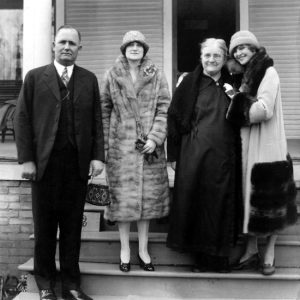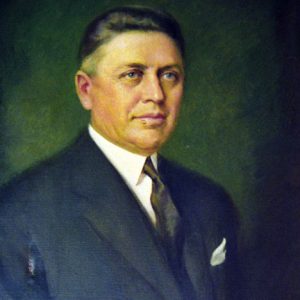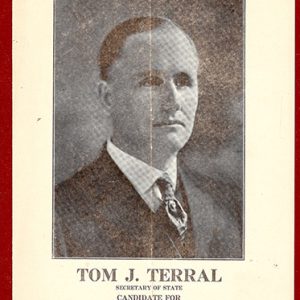calsfoundation@cals.org
Thomas Jefferson Terral (1882–1946)
Twenty-seventh Governor (1925–1927)
Lawyer and politician Thomas Jefferson Terral served the state of Arkansas as a two-term secretary of state and a governor from 1925 to 1927. Terral used his governorship to push for economic reforms and stability.
Thomas Jefferson Terral was born in Union Parish, Louisiana, on December 21, 1882, to George W. and Celia Terral. His father was a planter and merchant. Terral had numerous siblings. At the time of his death in 1946, two sisters and three brothers were living in Arkansas.
Beginning his education at the University of Kentucky, Terral transferred to the law school at the University of Arkansas (UA) in Fayetteville (Washington County). Graduating in 1910, Terral quickly entered the Arkansas bar, establishing a law practice in Little Rock (Pulaski County). He married Eula Terral in 1914. Eula had the same last name, but no close relation can be determined. The couple was childless.
Terral’s education and legal skill gained him a dual appointment in Arkansas government. When the General Assembly was in session, Terral served as the assistant secretary of the Arkansas Senate. When not serving in the Senate, he was the deputy state superintendent of public instruction. Clearly, both positions allowed Terral to make numerous contacts in Arkansas’s Democratic Party. Running for the secretary of state position in the election of 1916, Terral capitalized on these connections, easily winning the primary and general election. Performing well as the secretary of state, he was reelected in 1918. Terral ran for governor in the primary election in 1920 but lost. He placed third in a field of nine candidates, with Thomas Chipman McRae securing the nomination.
After Thomas Chipman McRae deferred Terral’s run for governor in the election of 1924, Terral sought the office again. Due to the rise of Ku Klux Klan’s influence in the state, Terral faced stiff opposition from the Klan-endorsed candidate, William Lee Cazort, in the Democratic primary. Realizing the power of the group, Terral sought to join the Klan in Arkansas. Denied membership in Arkansas due to the Klan’s support of Cazort, he was granted an honorary association with a klavern near his original home in Louisiana, thus eliminating the portrayal of Terral as the anti-Klan candidate. It is not known how much this actually influenced the election, as Terral energetically campaigned on the typical Arkansas platform of improved roads, education, and taxes. Terral defeated Cazort in the primary and crushed Republican challenger John W. Gabriel in the general election.
Terral’s governorship grappled with the same problems the previous governor, Thomas Chipman McRae, had in his term: a weak economic base and a series of complicated boards and commissions within the state. However, the state legislature, under Terral’s leadership, was more receptive to his legislative suggestion than they had been to McRae’s. As a result, it was easier for Terral to streamline government, move bills into laws, and adjust the tax base. To increase funding for education, he supported a luxury tax to fund financial aid programs for indigent students at the state’s colleges and universities.
Terral also targeted growing government inefficiency in the state. The overwhelming number of boards, commissions, and agencies in the Arkansas bureaucracy created excessive expenditures and a replication of powers. Terral’s plan reduced the number of existing boards and commissions from eleven with over sixty members to one board with three full-time, paid members: the Board of Charities and Corrections—which cost the state less than the older, inflated system. Furthermore, Terral consolidated the agencies concerned with revenue collection and various agricultural/environmental agencies, saving the taxpayers massive sums that could be funneled into education or highway improvement. Besides highways and education, the legislature funded a general hospital to support the school of medicine in Little Rock and Arkansas’s first state park on Petit Jean Mountain.
Terral did not fare as well with the General Assembly when debating the solution to the state’s highway funding. The source of taxation for highway monies, primary property holders, had been stretched thin by a number of taxes. Several legislators wanted to issue new bonds to fund highway improvements adequately. Terral opposed this stratagem, believing the state would then shoulder the burden of the debt instead of the local highway improvement districts, a precedent Terral did not want to establish. Instead, Terral requested a one-cent increase in gas taxes to augment the payment of the highway improvement districts’ debts, but the legislature refused to support it. As a result, little headway was made on the highway problem during Terral’s governorship.
As the election of 1926 approached, Terral felt optimistic about winning another term as governor. Challenged in the Democratic primary by John E. Martineau, Terral quickly found himself on the defensive. Martineau accused Terral of corrupt activities with the American Book Company, a textbook vender for public schools, and an insurance agency. Terral’s supporters claimed these were baseless allegations. Attempting to ignore them, Terral ran by promoting the positive aspects of his term; however, the electorate was not impressed. Terral was defeated by approximately 16,000 votes in the primary election. Martineau went on to win the general election.
After his governorship, Terral returned to his law practice in Little Rock. As a private citizen, he participated in the Pulaski Heights Baptist Church, Masons, and Modern Woodmen, to name a few of his civic ventures. Terral died on March 9, 1946, and is buried in Roselawn Memorial Park in Little Rock.
For additional information:
Donovan, Timothy P., Willard B. Gatewood Jr., and Jeannie M. Whayne, eds. The Governors of Arkansas: Essays in Political Biography. 2d ed. Fayetteville: University of Arkansas Press, 1995.
Williams, Nancy A., ed. Arkansas Biography: A Collection of Notable Lives. Fayetteville: University of Arkansas Press, 2000.
Derek Allen Clements
Pocahontas, Arkansas
 Mary Lewis (right) and Friends
Mary Lewis (right) and Friends  Eula Terral
Eula Terral  Thomas Terral
Thomas Terral  Terral Announcement Speech
Terral Announcement Speech 




Comments
No comments on this entry yet.